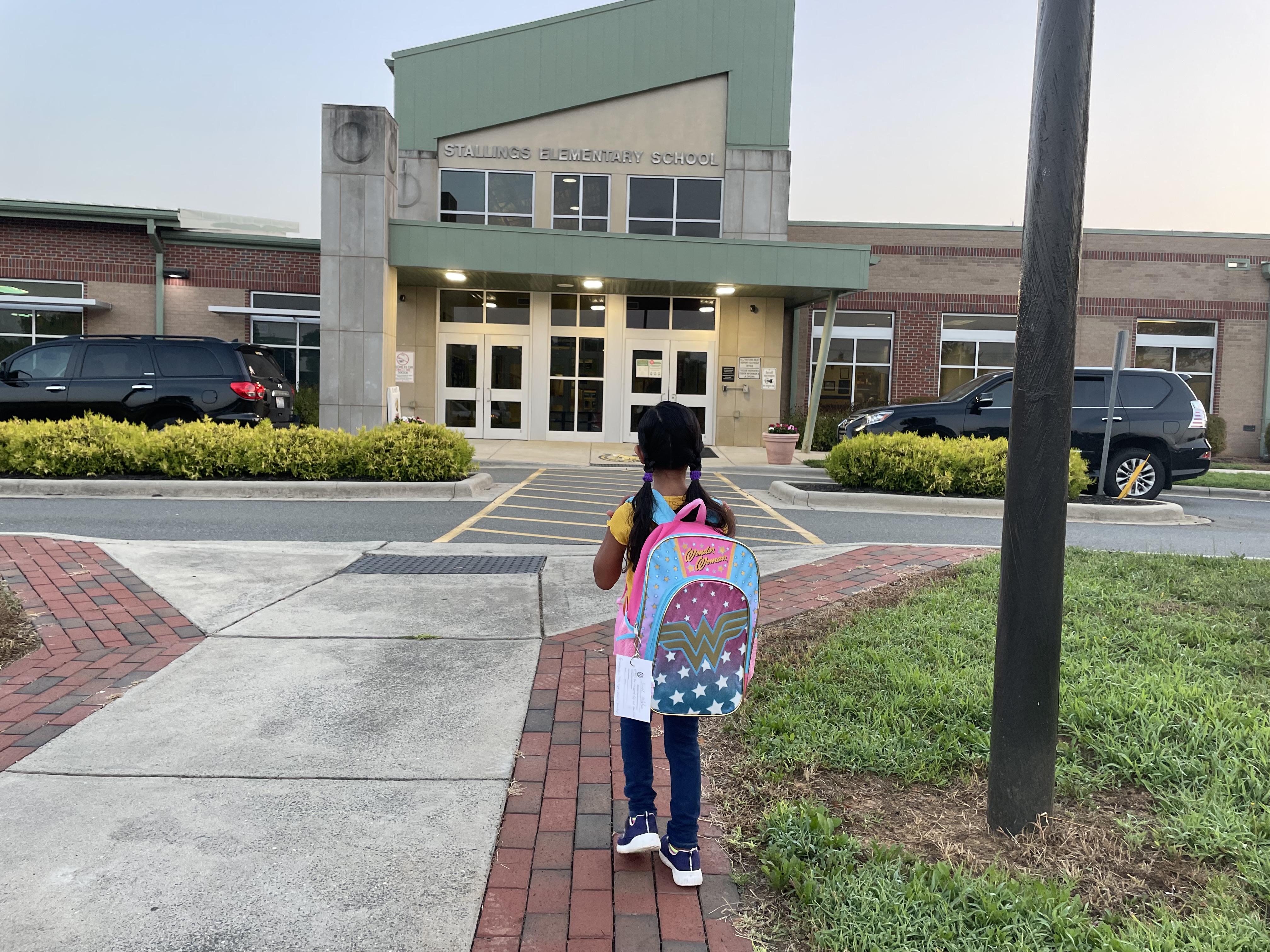An Open Letter to My Kindergartener
Your Inner Motivation Provides Magic
Dear Chhori (Daughter):
Congratulations on starting a long and exciting journey by officially beginning kindergarten today! It was lovely to see you so excited and enthusiastic when we dropped you off at your school. I hope the same level of excitement lasts throughout your school journey.
My excitement is a little subdued due to my concern about the Covid-19 pandemic and whether you would be safe. I know you'll feel uncomfortable wearing that damn mask, but it will help reduce the risk of you and those around you contracting the virus. Of course, you might see your classmates and others without masks. But as a responsible individual, I want you to follow the recommendations of the Center for Disease Control and local health officials. And please make sure you continue to wash your hands thoroughly from time to time during the school day, whenever possible.
Little champ, when I dropped you off, I was reminded of how I started my educational journey.
The environment and circumstances were so different from what you're going through today. My schooling began in 1990 in the remotest village Indrachowk, Dagana, Bhutan. Probably due to a lack of awareness about the importance of education, my parents chose not to enroll six of my elder siblings in school. Instead, they all stayed at home to help with the daily chores so that there would be 'food on the table' for everyone - technically, we used to sit on the floor to eat, and we did not have a table. So, although I was young, I too had a role in feeding Tikay, the family dog.
Things took a positive turn after my parents decided to enroll one of my older brothers in the Dokap Primary School in Dagana, Bhutan. He was a third-grader when my father also managed to enroll me in the same school. My eldest brother, who never had the opportunity to go to school, carried me on his shoulders during the monsoon season. He walked with me, downhill, for 30 minutes, and uphill for 45 minutes, across rough terrain, to get me to the school and back home. I would hold on tight with my hands wrapped around his head. As my brother pushed his way through shrubs and bushes during the monsoon season, leeches would cling to my head and suck my blood. It sometimes took me several minutes to pluck them off my body, often with the help of a pinch of salt, once we got to school. Our parents taught me that leeches are sensitive to salt. So, during the monsoon season, we always carried pouches of salt in our backpacks.
Kids your age who haven't seen the rest of the world might take many things for granted.
However, many children are still experiencing extreme poverty, hunger, and deprivation, similar to what I experienced. Thankfully, you have an air-conditioned school bus that pulls up outside our home, ready to take you to your school, which is within easy walking distance.
While I attended elementary school, some of the Bhutanese teachers treated me harshly. I struggled to learn Dzongkha, the national language. Sometimes abuse arrived by being beaten with sticks by the teachers and made to stand on one foot with the other foot resting across the knee. For the class duration, the teacher would demand that I catch my ears with both hands. As I struggled to carry out the punishments, classmates were encouraged to laugh at me. I am glad you'll be studying in a supportive environment without this type of trauma.
In 1991, when the Bhutanese regime evicted my family, we were forced to make our home on the bank of the holy Kankaimai river in Nepal. Many children and adults lost their lives following an outbreak of malaria and other diseases. Two from my own family couldn't make it; I'll share those details as you grow older and are mature enough to hear such stories. Later we moved to the Beldangi-II refugee camp, not very far from the riverbank. After arriving at the Beldangi-II refugee camp, both your mother and I somehow continued our schooling. When we first settled in the refugee camp, we attended classes in open spaces, mainly under the shadows of large trees and sometimes even during unfavorable weather conditions.
One day, around the time I was in grade three, a heavy wind blew a large solid-wood blackboard off the tree where it had been hanging, and it fell on my head. I received treatment from the nearest primary health unit. Fortunately, the injury was not too bad. However, before returning to lessons, I was mandated to rest for a few days.
Physical punishments were part of daily life in the refugee camp schools. Not that those teachers' intentions towards their students were terrible. It was how the whole educational institutions functioned during that time. Even today, I cannot understand why some teachers were harsher than others during my school days, both in Bhutan and in the refugee camp in Nepal.
We didn't have electricity in the refugee camp. I am glad you won't have to do your homework in the light of a kerosene lamp in the evenings like I did while living in the camp. The size of our tent-like hut was slightly bigger than your bedroom at home. The roof leaked, and we often got soaked during rainy days. Our large family lived in such conditions for almost 20 years before being resettled in 2009. I hope you'll continue to appreciate what you have without being judgemental. This is because life is full of ups and downs and it often involves a lot of ‘rethinking’, as I did over the years, to make it work; Take one step at a time and I am sure you’ll be fine.
The current system of education here is entirely different from when I was a schoolboy back in Bhutan and Nepal.
We used to have lots of homework. We had to remember long paragraphs at home and then recite them when we were in the classroom the following day. We didn't have practical lessons like you will enjoy.
As a young student, I didn't have shoes because my family couldn't afford them. Flip-flops were a bit affordable, and that's what I depended on even in extreme weather conditions. You should be proud that you've enough pairs of shoes. But always remember that it's not what you wear on your feet that takes your steps further. It's your inner willingness and the motivation that provides the magic.
As a new American, you have a place to call home – the United States of America—the beacon of hope and opportunities. You should always be thankful for this country which is your birthplace. In addition, this place gave your parents the chance to build new lives so that you, too, can enjoy freedoms, lacking in so many parts of the world.
I hope you'll learn to be a responsible resident.
Please keep in mind that freedom does not mean that you are free from obligations and responsibilities. Never take your freedoms or possibilities for granted. But, unlike your parents when we were your age, you will always have a roof over your head. You will always have enough food, including your favorite, chocolate ice cream, to eat when you return home.
Continue to share what you have with others.
You might never know if one of your classmates' families might be having a hard time. It might be that one of your new friends can't afford lunch. A classmate might be a resettled refugee going through the process of attempting to heal the wounds of past traumas. Your compassion and love will give such a friend purpose in life. So always consider sharing what you have if necessary. But be careful not to humiliate the person with your generosity.
Giving has to be done with sensitivity.
Now that you are in the outside world, you will probably see things from different perspectives. That's completely normal. I hope you'll soon learn to take a stand if you or your friends face the attacks of bullies. But, please, never put yourself, or them, at risk. Sadly, bullying is common. Keep in mind that both your mother and I do not want you to bully others or be involved with gangs of those who bully others, even if you think it will make you safe.
Never discriminate against those around you because of the color of their skin, caste, creed, or any particular physical differences or disabilities that sets them apart. You've started school at a time when in many parts of the world, for instance, the current situation in Afghanistan, women's fundamental rights, including the right to education, are under threat. As sad as I feel about that situation, I hope you'll soon learn to become a voice and strength for those who cannot speak up for themselves. So, again, never put yourself at risk, but use logic and reason rather than insults or harsh words to try to diffuse situations.
Being bilingual or multilingual is a strength, not a weakness.
I hope you'll continue to promote our language and culture up to a reasonable standard. We'll have the same language rule: Nepali at home and English at school. Culturally, we treat teachers as our second parents; I hope you'll carry on that legacy.
During the migration process newer generations often tend to forget their roots; don’t be one of them.
As you grow older, I hope things will change, drastically, in my home country Bhutan, so we could go back to trace our ancestral history. I hope you'll grow up mature enough to understand that it is essential to learn our history because it shapes your future. When we fled Bhutan, I left behind a stash of my school supplies wrapped in a plastic bag hidden inside our house because my mother promised we would return home soon. Unfortunately, 30 years have passed and, so far, we have been unable to return home. When I lived in the refugee camp, I learned that the regime burned down our house in Bhutan. I was saddened when I realized that my stash of school supplies had turned into ashes. Notably, that realization became part of my motivation to continue my education further. I am excited that you'll never have to go through a similar situation in your home country.
I am sharing these stories from our past for one reason only. I want you to know that you will continue to have more than is needed to excel and succeed academically and socially as a person.
"I will be fine," you assured us right before we dropped you off at your school today. We, too, hope that you'll be just fine. Keep rolling, girl; We can't wait to hug you upon your return from school today!
With unconditional love,
Your Baba (Dad)



